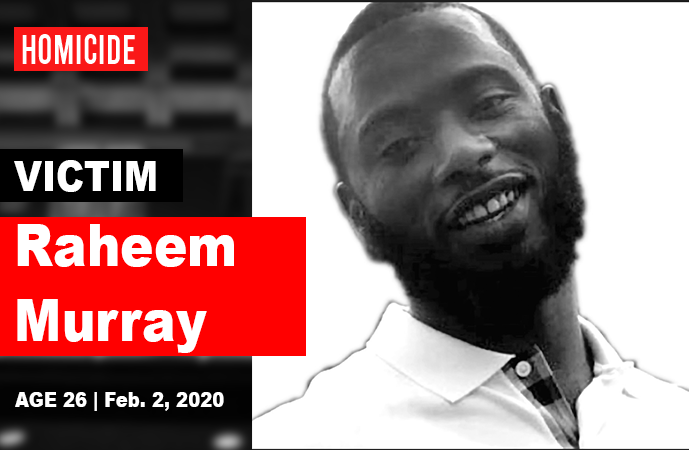
Thank you for reading D.C. Witness. Help us continue our mission into 2024.
Donate NowBy
Dayana Coronado [former]
, Jasmine Hernandez [former] - June 20, 2023
Daily Stories
|
Homicides
|
Shooting
|
Suspects
|
Victims
|
On June 20, DC Superior Court Judge Maribeth Raffinan sentenced Glen Dolford for his involvement in a 2020 fatal shooting.
Dolford, 29, was originally charged with first-degree murder while armed, assault with intent to kill while armed, and aggravated assault-grave risk while armed, among other charges, for his involvement in the fatal shooting of 26-year-old Raheem Murray on the 4000 block of 3rd Street, SE, on Feb. 2, 2020.
Murray died from seven gunshot wounds.
Detectives found video evidence from the scene which allegedly shows the defendant running up to Murray, who was lying on the ground, and shooting him in the head while standing over his body.
Dolford was originally charged with 13-counts, but due to a guilty plea on second-degree murder, aggravated assault, and assault with a dangerous weapon the other ten charges were dropped.
Judge Raffinan sentenced Dolford to 22-and-a-half-years in prison with five years of supervised release.
Sentencing conditions include credit for time served, registration as a gun offender, continued confinement and supervised release. All charges are to run concurrently.
Judge Raffinan recommended Dolford serve his time at the US Bureau of Prisons’ facility in Allenwood, Pennsylvania. He’s also required to participate in substance abuse treatment and pay $300 to the Victims’ Fund.
Prosecutors began by reflecting on Dolford’s sentencing memorandum, focusing heavily on Dolford’s lack of remorse.
“We cannot blame the circumstances for the choices we make,” prosecutors stated in reflection to Dolford’s “excuse-like”statements in the memorandum.
Three of Murray’s family members presented victim impact statements to the court prior to Judge Raffinan imposing the sentence. “My life will never be the same, and neither should yours,” Murray’s mother said in a letter read by prosecutors. She said, “Based on video evidence, my child was chased down like an animal.”
She mentioned that her son was 26, and argued that 22-and-a-half years was not enough time for justice to be served.
Murray’s stepfather, who previously worked for 29 years in the Metropolitan Police Department (MPD) said that he had to give Murray his own kufi, an African-style hat, since Murray’s own no longer fit due to the large hole left by the gunshot wound on his head.
Murray’s sister asked Dolford, “Why Raheem? Why did you continue to shoot after 25 rounds? After he fell down the hill? After he was unresponsive? Why did you go back and shoot more?”.
Defense attorney Frances D’Antuono explained briefly how Dolford experienced childhood trauma, and suffers from a neurological disorder. She requested Dolford to enter mental health treatments and a challenge program.
“Can you please give me a chance to get into a challenge program, to show that this isn’t me, that things happen, and to correct my wrongs?” pleaded Dolford in his last statement before sentencing.
Imposing her sentence Judge Raffinan said that “the video speaks for itself”, and “the injuries found from this case cannot be mediated”.
The defendant’s aunt who was present in court told D.C. Witness, “That’s not my nephew; he’s not a murderer.”
She also said the victim was not a saint and her nephew was trying to defend himself. According to Dolford’s aunt the incident was a “quarrel between the neighborhoods” and it was “territorial”.
The defendant’s sister said, “He was a stand-up guy.”
Follow this case